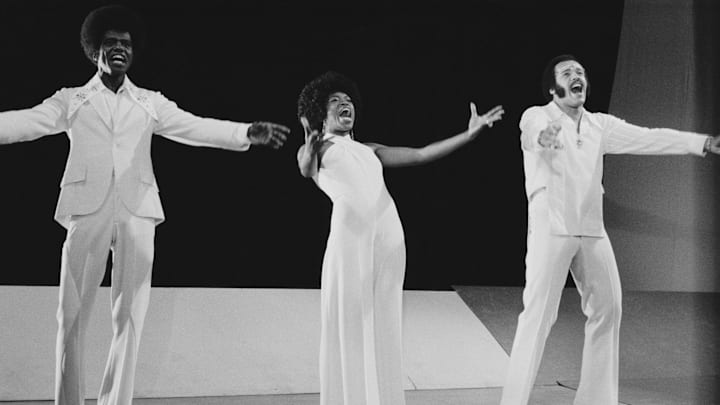"Rock the Boat" is a classic disco and soul song by The Hues Corporation, written by Wally Holmes. and referred to by a writer at Stereogum as "a gloriously dumb song." It was released in 1973 as the biggest track of their debut album, Freedom for the Stallion. The reasonably catchy song became a major hit, reaching number one on the Billboard Hot 100 chart in the United States in 1974, the same year as other well-known hits, such as the moody "Time in a Bottle" by Jim Croce. The Hues Corporation was primarily a vocal trio consisting of St. Clair Lee, Fleming Williams, and Hubert Ann Kelley.
There were other musicians on the track, including Wilton Felder on bass (who also played for The Jackson 5 and Marvin Gaye), Joe Sample on piano, Larry Carlton on guitar., and Jim Gordon on drums. What could be said about the music itself, though? It is disco, and a catchy tune, but comes across as rather straightforward with the cheerful vocals dominating.
Of course, one of the dark ironies of this feel-good tune is that Gordon wound up in prison for murdering his own mother, in addition to Fleming Williams apparently dying by suicide. It really just goes to show you: You really can never fully escape life's darkness anywhere, can you? It's even objectively there when reading up on the history of the band members of an upbeat disco tune! Still, sometimes you gotta try to dance away those tears, and that's just what songs like this are for.
“Rock the Boat" made The Hues Corporation a one-hit wonder
"Rock the Boat" is known for its catchy melody, upbeat tempo, and danceable rhythm. The lyrics suggest a carefree and joyful attitude, encouraging people to let loose and enjoy life. The success of "Rock the Boat" led to the song being covered and sampled by various artists over the years, and its infectious groove continues to be associated with the disco era. It has even become a fairly standard dance song at Irish weddings, where attendees mimic rowing and rocking a boat while dancing (a little search on YouTube can confirm that, yes, this has become a bit of a tradition over there).
https://www.distractify.com/p/derry-girls-rock-the-boat-dance
The Hues Corporation did not replicate the same level of success with subsequent releases, and "Rock the Boat" remains their most well-known song, even though they released five more studio albums after Freedom for the Stallion.
Of course, disco went through a period of decline, like so many other forms. Not everyone is a huge disco fan, and some punk bands even started out (to some degree) to challenge the bubblegum pop nature of such music (though disco no doubt influenced some would-be punk bands to travel a disco/pop-informed new wave route). Still, it was a notable music form, this is one of its most remembered songs. Some people see it as (typically) a non-serious genre for dancing and having a good time. If nothing else, disco songs often have memorable basslines and sing-songy choruses.
It's not the first chart-topping disco tune
People debate whether "Rock the Boat" is the first disco song to hit number one on the Billboard Hot 100 chart, or if it's Love Unlimited Orchestra's "Love's Theme " (an instrumental composed by Barry White). Others give that distinction to "TSOP (The Sound of Philadelphia)" by MFSB, which was the theme to Soul Train, which sounds even more disco-like than "Love's Theme" and also came out before "Rock the Boat." What can a person say? Objectively, those two songs charted first, have clear disco elements, and it's not like their slightly earlier success takes that much away from The Hues Corporation.
The group was pretty well known, but their song is still surely better known than the group name itself. It's also the case that people listen to and enjoy their other songs, too. Their song "Miracle Maker (Sweet Soul Shaker)" is more of a traditional-sounding soul tune, which may be why it didn't receive the same level of attention as "Rock the Boat," which was a relatively more energetic song for dancefloors. Whether you love this song or find it less than amazing, it's still a part of music history, and also a part of some Irish wedding parties.
